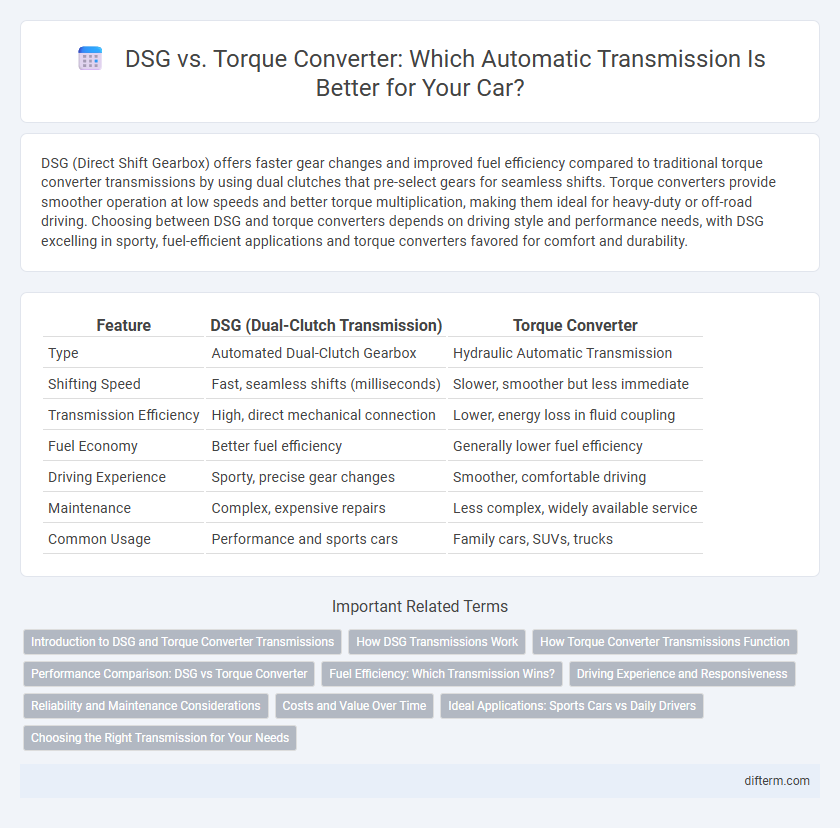DSG (Direct Shift Gearbox) offers faster gear changes and improved fuel efficiency compared to traditional torque converter transmissions by using dual clutches that pre-select gears for seamless shifts. Torque converters provide smoother operation at low speeds and better torque multiplication, making them ideal for heavy-duty or off-road driving. Choosing between DSG and torque converters depends on driving style and performance needs, with DSG excelling in sporty, fuel-efficient applications and torque converters favored for comfort and durability.
Table of Comparison
| Feature | DSG (Dual-Clutch Transmission) | Torque Converter |
|---|---|---|
| Type | Automated Dual-Clutch Gearbox | Hydraulic Automatic Transmission |
| Shifting Speed | Fast, seamless shifts (milliseconds) | Slower, smoother but less immediate |
| Transmission Efficiency | High, direct mechanical connection | Lower, energy loss in fluid coupling |
| Fuel Economy | Better fuel efficiency | Generally lower fuel efficiency |
| Driving Experience | Sporty, precise gear changes | Smoother, comfortable driving |
| Maintenance | Complex, expensive repairs | Less complex, widely available service |
| Common Usage | Performance and sports cars | Family cars, SUVs, trucks |
Introduction to DSG and Torque Converter Transmissions
Direct Shift Gearbox (DSG) transmissions utilize dual clutches to enable rapid and seamless gear changes, enhancing driving performance and fuel efficiency. Torque converter transmissions rely on a fluid coupling mechanism to transfer engine power smoothly, prioritizing comfort and durability in varying driving conditions. Both systems serve distinct automotive needs, with DSG emphasizing speed and precision, and torque converters focusing on smoothness and reliability.
How DSG Transmissions Work
DSG transmissions utilize a dual-clutch system to pre-select gears, enabling rapid and seamless gear shifts without interrupting engine power delivery. Each clutch independently controls odd and even gears, allowing for faster acceleration and improved fuel efficiency compared to traditional torque converters. This design reduces shift lag and enhances driving dynamics by providing smoother transitions and better control over power transfer.
How Torque Converter Transmissions Function
Torque converter transmissions use a fluid coupling mechanism to transfer engine power smoothly to the transmission, allowing for seamless acceleration without direct mechanical connection. This hydraulic system comprises a pump, turbine, and stator that work together to multiply torque and absorb engine vibrations. Unlike DSG transmissions, torque converters provide enhanced damping and smoother shifting in stop-and-go traffic conditions.
Performance Comparison: DSG vs Torque Converter
DSG (Direct Shift Gearbox) transmissions offer faster and more precise gear changes compared to traditional torque converter automatics, resulting in improved acceleration and fuel efficiency. Torque converters provide smoother shifts by using hydraulic fluid to transfer power, which can enhance comfort but often leads to slight power loss and slower response times. In performance-oriented vehicles, DSG systems deliver superior driving dynamics through rapid, seamless gear changes and reduced drivetrain lag.
Fuel Efficiency: Which Transmission Wins?
DSG transmissions typically deliver superior fuel efficiency compared to torque converter automatics due to quicker, more precise gear shifts and reduced energy losses. Torque converters often experience increased fluid drag, which can lower fuel economy under various driving conditions. Studies show DSG systems can improve fuel consumption by up to 10% in city and highway driving scenarios.
Driving Experience and Responsiveness
DSG transmissions deliver faster and more precise gear shifts than torque converters, enhancing acceleration and overall driving dynamics. Their dual-clutch system reduces power loss and maintains engine momentum, resulting in immediate throttle response and smoother transitions. Torque converters offer smoother low-speed driving but often sacrifice responsiveness and driving engagement compared to DSGs.
Reliability and Maintenance Considerations
DSG transmissions offer faster gear shifts and improved fuel efficiency but can require more frequent maintenance due to their complex dual-clutch system and reliance on precise electronic controls. Torque converter automatics are generally known for durability and lower maintenance costs, with fewer components subject to wear and less sensitive to fluid contamination. Reliability in long-term use often favors torque converters, especially in heavy-duty or harsh driving conditions where robust mechanical design outperforms sophisticated electronics.
Costs and Value Over Time
DSG transmissions typically offer higher upfront costs due to advanced dual-clutch technology but deliver improved fuel efficiency and faster shift times, enhancing long-term value through lower fuel expenses and potential performance benefits. Torque converter automatics generally have lower initial purchase and maintenance costs, though they may experience reduced efficiency and increased wear over time, impacting total ownership costs. Evaluating DSG versus torque converter involves balancing immediate investment against potential savings in fuel and driving experience throughout the vehicle's lifespan.
Ideal Applications: Sports Cars vs Daily Drivers
DSG transmissions excel in sports cars due to their rapid gear shifts and enhanced driver control, delivering superior acceleration and responsiveness on performance-focused vehicles. Torque converter automatics suit daily drivers by providing smooth, comfortable shifting and better low-speed drivability, ideal for stop-and-go city traffic and fuel efficiency. Sports cars benefit from DSG's direct mechanical connection for precision, while torque converters prioritize comfort and reliability in everyday commuting scenarios.
Choosing the Right Transmission for Your Needs
Dual-clutch transmissions (DSG) offer faster gear shifts and improved fuel efficiency compared to traditional torque converters, making them ideal for performance-oriented drivers. Torque converters provide smoother operation and better low-speed drivability, preferred in heavier vehicles or stop-and-go traffic conditions. Selecting the right transmission depends on balancing priorities such as driving style, fuel economy, and vehicle type to ensure optimal performance and comfort.
DSG vs torque converter Infographic

 difterm.com
difterm.com